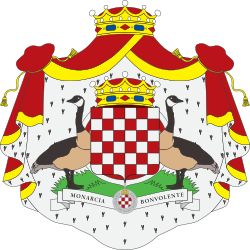Constitution of Sancratosia
| Constitution of the Principality of Sancratosia | |
|---|---|
 | |
| Overview | |
| Original title | (in Lingua Franca Nova) Constitui de la Prinsia de Sancratosia |
| Jurisdiction | Sancratosia |
| Ratified | 2 December 2021 |
| Date effective | 2 December 2021 |
| System | Semi-constitutional monarchy |
| Government structure | |
| Branches | Three (executive, legislative and judicial) |
| Head of state | Sovereign Princess |
| Chambers | Unicameral (National Council) |
| Executive | Minister-led Government Council responsible to the Sovereign Princess Minister of State as head of government |
| Judiciary | Supreme Court is established to safeguard the Constitution and decide of the validity of the laws in accordance to the Constitution; no other part of the court system is directly referenced. |
| Federalism | Unitary |
| Electoral college | No |
| Entrenchments | 1 circumstantial one |
| First executive | 11 January 2022 |
| Location | Duchess Jana I National Museum and Archives |
| Author(s) | Princess Cloe |
| Signatories | Princess Cloe |
| Media type | Online[a] |
 |
|---|
| This article is part of a series on the politics and government of Sancratosia |
|
|
The Constitution of Sancratosia (Lingua Franca Nova: Constitui de la Prinsia de Sancratosia) was adopted on 2 December 2021, following the independence of the Principality. It was subsequently published in the first edition of the Jornal de Sancratosia on 17 December 2021.[1] The Constitution serves as the fundamental law of the Principality of Sancratosia.
Inspiration
The Constitution of Sancratosia is structurally similar to the Constitution of Monaco.
Provisions
The Constitution of Sancratosia comprises a Preamble and 96 articles, organized into 12 titles.
Preamble
The preamble establishes the authorship of the Constitution to the Sovereign Princess, stating:
- We, Cloe, by the popular and national will, Sovereign Princess of Sancratosia;
We have determined to give a Constitution, which, by Our sovereign will, is from this moment considered as the fundamental law of the State and can only be modified in the terms that We have determined.
Title I: The Principality and the public powers
This title includes articles 1 to 9, outlining the fundamental principles of the Principality. It establishes the separation of powers, defines the flags and coat of arms, and specifies the official and recognized languages.
Title II: The Princess and the devolution of the Crown
This title encompasses articles 10 to 16 and details the relationship between the State and the Sovereign Family, specifying powers not devolved to other organs of the Principality.
Title III: The freedoms and fundamental rights
Articles 17 to 32 form this title, which serves as Sancratosia's bill of rights. It enshrines fundamental rights and freedoms, including individual security, inviolability of the home, right to private and familial life, freedom of religion, right to education, and freedom of association.
Title IV: The public domain and the public finances
This title, comprising articles 33 to 42, explains the conditions under which private property becomes public and outlines budgetary provisions, prioritizing the expenses of the Sovereign Family from the general revenues of the State.
Title V: The Government
Articles 43 to 51 concern the Government Council, establishing the position of Minister of State and delineating the powers of the Government Council.
Title VI: The State Council
Article 52 establishes the State Council.
Title VII: The National Council
This title includes articles 53 to 74, which establish the National Council, detail the election and eligibility of its members, its meetings, the legislative process, and its dissolution.
Title VIII: The Crown Council
Articles 75 to 77 establish the Crown Council.
Title IX: The Municipality
This title, comprising articles 78 to 87, concerns the Municipality, establishing its administrative body, the Municipal Council, and detailing the election of its members, its meetings, and its dissolution.
Title X: The Justice
Articles 88 to 92 pertain to the administration of justice, establishing the Supreme Court, the nomination of its members, and its jurisdiction.
Title XI: Revision of the Constitution
Articles 93 to 95 provide the process for the revision of the Constitution.
Title XII: Final dispositions
Article 96, the shortest title, concerns the entry into force of the Constitution.
See also
Notes and References
Notes
- ↑ A physical signed copy is kept at the Duchess Jana I National Museum and Archives.
References
- ↑ Principality of Sancratosia (17 January 2022), "Journal of Sancratosia no 1", sancratosia.org
